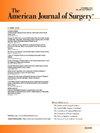内分泌手术的学员口述:对教育和报销的影响
IF 2.7
3区 医学
Q1 SURGERY
引用次数: 0
摘要
我们所在大学的外科部门最近改由主治医师撰写手术报告。我们进行了一项混合方法调查,以确定由受训者发起的内分泌手术报告是否与特定手术的编码不足有关。我们从账单数据中确定了 2020 年 7 月至 2022 年 6 月期间进行的内分泌手术。审查了政策实施前和政策实施后的 RVU 分布情况以及备注修改历史记录,以确定受训人员在主治医师备注修改过程中捕获可计费差异的频率。共确定了 714 例手术和 1138 个计费程序。由于主治医生对术中甲状旁腺激素监测编码的改变,仅甲状旁腺切除术就显示出更大的主治医生报告平均 RVU 值。受训人员更有可能错过编码修改器 22,但主治医生修改备注可避免 RVU 损失。与仅由主治医师提供的报告相比,由受训医师主动提供的手术报告与内分泌手术的 RVU 损失无关。通过强调程序计费差异和手术推理方面的教育,可以改善受训人员的口述能力。本文章由计算机程序翻译,如有差异,请以英文原文为准。
Trainee-initiated dictations of endocrine surgeries: Implications for education and reimbursement
Introduction
Our university-based surgery department recently transitioned to attending-only authorship of operative reports. We performed a mixed-methods investigation to determine if trainee-initiated endocrine surgical reports were associated with under-coding of specific procedures.
Methods
Endocrine operations performed from July 2020 to June 2022 were identified from billing data. Pre- and post-policy RVU distributions and note modification history were reviewed to determine how often trainees captured billable differentiators over attending note modification.
Results
714 operations and 1138 billed procedures were identified. Parathyroidectomy alone showed greater mean RVUs with attending-only reports attributable to attending practice change in coding for intraoperative parathyroid hormone monitoring. Trainees were more likely to miss coding modifier 22 but RVU losses were prevented by attending note modification.
Conclusion
Trainee-initiated operative reports were not associated with RVU losses for endocrine operations compared to attending-only reports. Trainee dictation can be improved by emphasizing education on procedural billing differences and surgical reasoning.
求助全文
通过发布文献求助,成功后即可免费获取论文全文。
去求助
来源期刊
CiteScore
5.00
自引率
6.70%
发文量
570
审稿时长
56 days
期刊介绍:
The American Journal of Surgery® is a peer-reviewed journal designed for the general surgeon who performs abdominal, cancer, vascular, head and neck, breast, colorectal, and other forms of surgery. AJS is the official journal of 7 major surgical societies* and publishes their official papers as well as independently submitted clinical studies, editorials, reviews, brief reports, correspondence and book reviews.

 求助内容:
求助内容: 应助结果提醒方式:
应助结果提醒方式:


